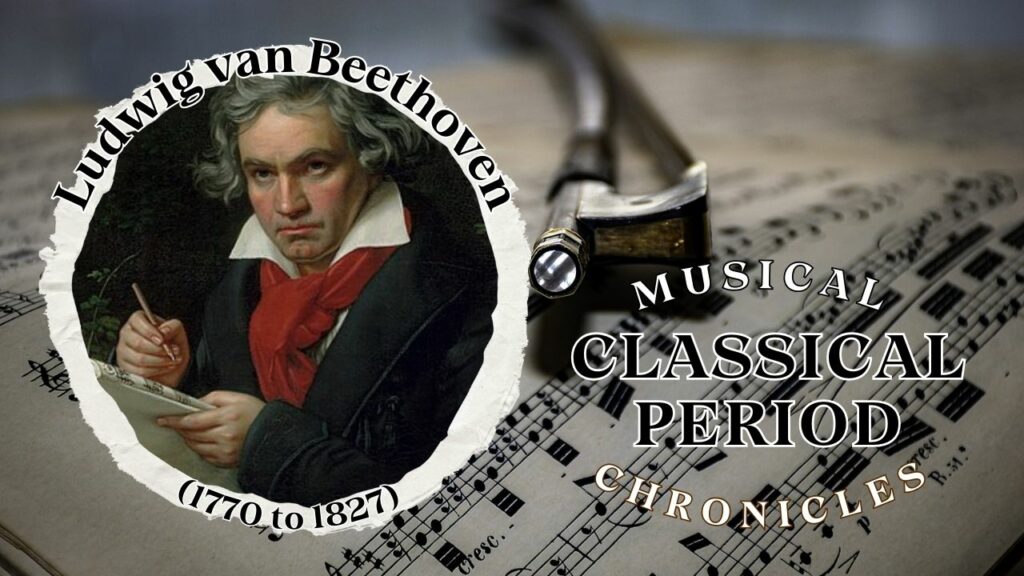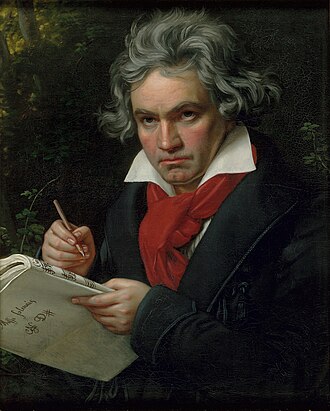
Ludwig van Beethoven (1770-1827)
The Deafening Silence: Beethoven’s Overture to Adversity
In the heart of Bonn, where cobblestone streets echo with the cadence of daily life, a child named Ludwig van Beethoven entered a world of melody and dissonance. Born into a family of musicians, young Beethoven’s destiny was entwined with the strands of music that would one day compose the symphony of his extraordinary life.
As the son of a tenor in the court chapel, Beethoven’s early years resonated with the harmonies of a burgeoning talent. However, life in Bonn was not a tranquil sonata; it was a dynamic composition marked by moments of crescendo and diminuendo. Beethoven’s journey, much like his music, began with an overture—an introduction to a world that would soon reveal its complexities and challenges.
The symphony of Beethoven’s life took its first breath in December 1770, a time when the echoes of classical brilliance still lingered in the air. The composer-to-be arrived in an era where the nuances of courtly life and artistic expression intermingled, creating an environment ripe for the cultivation of genius.
Yet, amidst the harmonious notes of artistic endeavors, a somber undertone emerged—the fading echoes of Beethoven’s diminishing hearing. An unseen adversary was weaving its threads into the fabric of his existence, foreshadowing a struggle that would shape his symphonies and sonatas.
The hook, like a striking chord in the opening bars of a composition, introduces us to the disquieting undercurrents of Beethoven’s narrative. The overture has begun, and we, the audience, stand at the precipice of a musical odyssey that transcends the boundaries of both sound and silence. Join us as we unravel the layers of Beethoven’s life—a life that mirrored the tumultuous crescendos and soulful adagios of his masterpieces.
The Prelude: Beethoven’s Prelude to Greatness

The cobblestone streets of Bonn cradled the footsteps of a young Ludwig van Beethoven, his journey through life marked by an early immersion into the world of music. Born on December 16, 1770, into a family of musicians, Beethoven inherited not just a name but a legacy—an inheritance of melodies and harmonies that would echo through the corridors of time.
His father, Johann van Beethoven, a tenor in the court chapel, recognized the burgeoning talent within his son. Beethoven’s childhood unfolded amidst the rich tapestry of Bonn’s musical culture, a city where the resonance of classical brilliance harmonized with the rhythm of daily life. It was in this environment that the seeds of Beethoven’s genius were sown, germinating in the fertile soil of artistic exploration.
As young Ludwig van Beethoven navigated the alleys of Bonn, his ears attuned to the symphonies of his surroundings, he also encountered the first signs of an insidious adversary—deafness. The world that had spoken to him in melodies, the world he was destined to interpret and redefine, began to withdraw into a muted silence.
The prodigious composer’s early life unfolded against the backdrop of societal and political transformations. The late 18th century, an era marked by the French Revolution and the rise of Enlightenment ideals, mirrored the revolutionary fervor brewing within Beethoven’s own compositions. His work would later reflect the spirit of the age—assertive, challenging, and revolutionary.
The canvas of Beethoven’s existence was painted with the brushstrokes of passion and determination. His dedication to his craft propelled him into the limelight of Vienna, the heart of classical music. However, Beethoven’s ascent to greatness was not without the shadows of personal tribulations. His tumultuous relationships, financial struggles, and the ever-encroaching specter of deafness added shades of complexity to the unfolding symphony of his life.
Amidst these challenges, Beethoven’s music became a vehicle for profound self-expression. His compositions, from the thunderous notes of the Fifth Symphony to the haunting beauty of the Moonlight Sonata, transcended the boundaries of time and spoke directly to the human soul.
The prodigy of Bonn, now a maestro in Vienna, continued to compose amidst the dichotomy of his internal and external worlds. The melodies that flowed from his pen carried the weight of his experiences, revealing not only the triumphs but also the tragedies of a life lived in pursuit of artistic excellence.
The overture of Beethoven’s life, as we delve into the beginning, sets the stage for the crescendo of his symphonic genius. Join us as we traverse the corridors of history, where the young Ludwig, against the tapestry of Bonn, begins the symphony that will resonate through the ages.
A Moment in Beethoven’s Epoch
We interrupt this show for an important announcement.
A hushed silence blanketed Vienna as news of Napoleon’s conquests and the ensuing chaos reached the ears of its inhabitants. It was a period of political upheaval, echoing the revolutionary chords that Beethoven himself infused into his compositions. The city, a crucible of artistic fervor, found itself at the crossroads of history.
The Viennese streets, once alive with the cadence of daily life, now trembled under the weight of uncertainty. Citizens gathered in whispered clusters, exchanging rumors and anxieties. Beethoven, the maestro of the symphony, was not immune to the reverberations of the world around him.
The political turmoil mirrored the turbulence within Beethoven’s soul. Deafness, a relentless adversary, gnawed at the edges of his auditory world. The deafening silence within him mirrored the quietude settling over Vienna—a city poised on the precipice of change.
As the city grappled with the ebb and flow of political tides, Beethoven faced a personal tempest. The dissonance between the revolutionary spirit he sought to capture in his compositions and the silence encroaching upon his own senses became a poignant allegory for the zeitgeist of the era.
Rumors of Napoleonic triumphs and defeats mingled with the whispers of Beethoven’s struggle against deafness. The interruption in the symphony of Vienna’s daily life mirrored the challenges faced by the composer, as the harmonies of his inner world clashed with the dissonance of external chaos.
In this momentary pause, Vienna held its breath, caught between the staccato beats of political unrest and the silent notes of Ludwig van Beethoven’s internal discord. The interruption, a testament to the interconnectedness of individual and collective narratives, highlighted the symbiotic relationship between an artist and the world that shaped him.
And now, back to the show.
Beethoven’s Ode to the Unheard
As the city of Vienna gradually emerged from the shadows of political upheaval, the echoes of uncertainty lingered in the air. Beethoven, too, navigated the tempest within and without, finding solace in the language of his compositions. The resumption of the symphony of daily life mirrored the maestro’s determination to persist in the face of adversity.
The streets, once marked by whispers of unrest, now witnessed the resilient pulse of a city reclaiming its rhythm. Beethoven, like a conductor orchestrating a grand return, composed his music as a testament to the indomitable spirit that courses through the veins of a resilient people.
Adding to the renewed vibrancy of Vienna, Beethoven’s compositions took on a renewed fervor. The symphonies, sonatas, and concertos flowed from his pen, each note an assertion of his defiance against the silence encroaching upon his world. The mainstay part of his life became a crescendo, a proclamation of artistic resilience.
Beethoven, despite the isolation imposed by his deafness, sought connection through his music. The return to the symphony of Vienna was, for him, a metaphorical return to the universal language of humanity. The melodies that once reverberated through crowded concert halls now echoed in the hearts of those who listened with more than just their ears.
In this resumption, Beethoven shared the harmony he found within the depths of his silent world. The centerpiece of his life unfolded as a revelation—an exploration of the boundless possibilities that emerge when an artist grapples with adversity. Beethoven, in his return to the musical forefront, demonstrated that the symphony of one’s life can be both a personal odyssey and a shared experience.
Vienna, too, embraced the renewed melodies, its streets alive with the rhythms of a city that had weathered the storm. Beethoven’s compositions, once interrupted by the cacophony of external turmoil, now soared above the cityscape, a triumphant anthem to the resilience of the human spirit.
And now, as the symphony of Beethoven’s life resumes its inexorable march, we delve deeper into the chords of his existence. His accomplishments set the stage for an exploration of the man behind the music, inviting the audience to witness the crescendos and decrescendos that define the tumultuous yet triumphant symphony of Beethoven’s life.
Beethoven’s Legacy and the Prelude to Bach
As the final notes of Beethoven’s Symphony No. 9 lingered in the air, Vienna stood witness to a musical epoch that transcended time. The resounding success of his compositions marked not only the triumph of an individual artist but also the triumph of the collective human spirit. Beethoven’s life had become a symphony, a testament to the power of perseverance in the face of adversity.
In the resolution of this episode, we find ourselves at the crossroads of Beethoven’s journey. The symphony he conducted through life echoed with both the sweet strains of victory and the poignant melodies of struggle. As the curtain fell on this chapter, Vienna basked in the afterglow of artistic transcendence.
The legacy Beethoven left behind was not just a collection of musical notes; it was an invitation to confront the silence within and find the courage to compose one’s symphony despite the deafening noise of the world. This reminder serves as a tribute to Beethoven’s enduring influence, emphasizing that his compositions were not merely melodies but beacons of inspiration.
With all the applause and accolades, Beethoven’s final bow on the stage of life marked the end of an era. However, the echoes of his symphonies lingered, setting the stage for the next movement in the grand orchestration of musical history.
As we bid farewell to Ludwig van Beethoven, we find ourselves standing at the threshold of a new episode—Johann Sebastian Bach, a composer whose life and music reverberate through the corridors of time. The completion of Beethoven’s narrative serves as a preamble to Bach’s tale, teasing the audience with the promise of a different era and a distinct harmonic landscape.
Bach’s counterpoint, intricate and precise, awaits our exploration. The finale of Beethoven’s episode beckons us to journey further into the rich tapestry of musical history, where each note is a brushstroke, painting a portrait of the artists who dared to defy the silence and compose symphonies that would resonate for centuries to come. The departure from Beethoven’s narrative propels us into the cadence of Bach’s life, where a new symphony awaits its moment to unfold.
Return to the Classical Period Chronicles home page.
